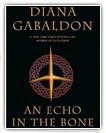Outlander aka Cross Stitch - Gabaldon Diana (библиотека электронных книг txt) 📗
“Aren’t you afraid. I might kill you in your sleep some night, if you don’t know who I am?”
He didn’t answer, but took his arm away from his eyes, and his smile widened. His eyes must be from the Fraser side, I thought. Not deepset like the MacKenzies’, they were set at an odd angle, so that the high cheekbones made them look almost slanted.
Without troubling to lift his head, he opened the front of his shirt and spread the cloth aside, laying his chest bare to the waist. He drew the dirk from its sheath and tossed it toward me. It thunked on the boards at my feet.
He put his arm back over his eyes and stretched his head back, showing the place where the dark stubble of his sprouting beard stopped abruptly, just below the jaw.
“Straight up, just under the breastbone,” he advised. “Quick and neat, though it takes a bit of strength. The throat-cutting’s easier, but it’s verra messy.”
I bent to pick up the dirk.
“Serve you right if I did,” I remarked. “Cocky bastard.”
The grin visible beneath the crook of his arm widened still further.
“Sassenach?”
I stopped, dirk still in my hand.
“What?”
“I’ll die a happy man.”
Chapter 17. WE MEET A BEGGAR
We slept fairly late the next morning, and the sun was high as we left the inn, heading south this time. Most of the horses were gone from the paddock, and none of the men from our party seemed to be about. I wondered aloud where they had gone.
Jamie grinned. “I canna say for sure, but I could guess. The Watch went that way yesterday” – he pointed west – “so I should say Rupert and the others have gone that way.” Pointing east.
“Cattle,” he explained, seeing that I still didn’t understand. “The estate-holders and tacksmen pay the Watch to keep an eye out, and get back their cattle, if they’re stolen in a raid. But if the Watch is riding west toward Lag Cruime, any herds to the east are helpless – for a bit, anyway. It’s the Grants’ lands down that way, and Rupert’s one of the best cattle-lifters I’ve ever seen. Beasts will follow him anywhere, wi’ scarcely a bleat amongst them. And since there’s no more entertainment to be had here, most likely he’s got restless.”
Jamie himself seemed rather restless, and set a good pace. There was a deer trail through the heather, and the going was fairly easy, so I kept up with no difficulty. After a bit, we came out onto a stretch of moorland, where we could walk side by side.
“What about Horrocks?” I asked suddenly. Hearing him mention the town of Lag Cruime, I had remembered the English deserter and his possible news. “You were supposed to meet him in Lag Cruime, weren’t you?”
He nodded. “Aye. But I canna go there now, wi’ both Randall and the Watch headed that way. Too dangerous.”
“Could someone go for you? Or do you trust anyone enough?”
He glanced down at me and smiled. “Well, there’s you. Since ye didna kill me last night after all, I suppose I may trust you. But I’m afraid you couldna go to Lag Cruime alone. No, if necessary, Murtagh will go for me. But I may be able to arrange something else – we’ll see.”
“You trust Murtagh?” I asked curiously. I had no very friendly feelings toward the scruffy little man, since he was more or less responsible for my present predicament, having kidnapped me in the first place. Still, there was clearly a friendship of some kind between him and Jamie.
“Oh, aye.” He glanced at me, surprised. “Murtagh’s known me all my life – a second cousin of my father’s, I think. His father was my-”
“He’s a Fraser, you mean,” I interrupted hastily. “I thought he was one of the MacKenzies. He was with Dougal when I met you.”
Jamie nodded. “Aye. When I decided to come over from France I sent word to him, asking him to meet me at the coast.” He smiled wryly. “I didna ken, ye see, whether it was Dougal had tried to kill me earlier. And I did not quite like the idea of meeting several MacKenzies alone, just in case. Didna want to end up washing about in the surf off Skye, if that’s what they had in mind.”
“I see. So Dougal isn’t the only one who believes in witnesses.”
He nodded. “Very handy things, witnesses.”
On the other side of the moorland was a stretch of twisted rocks, pitted and gouged by the advance and retreat of glaciers long gone. Rainwater filled the deeper pits, and thistle and tansy and meadowsweet surrounded these tarns with thick growth, the flowers reflected in the still water.
Sterile and fishless, these pools dotted the landscape and formed traps for unwary travelers, who might easily stumble into one in darkness and be forced to spend a wet and uncomfortable night on the moor. We sat down beside one pool to eat our morning meal of bread and cheese.
This tarn at least had birds; swallows dipped low over the water to drink, and plovers and curlews poked long bills into the muddy earth at its edges, digging for insects.
I tossed crumbs of bread onto the mud for the birds. A curlew eyed one suspiciously, but while it was still making up its mind, a quick swallow zoomed in under its bill and made off with the treat. The curlew ruffled its feathers and went back to its industrious digging.
Jamie called my attention to a plover, calling and dragging a seemingly broken wing near us.
“She’s a nest somewhere near,” I said.
“Over there.” He had to point it out several times before I finally spotted it; a shallow depression, quite out in the open, but with its four spotted eggs so close in appearance to the leaf-speckled bank that when I blinked I lost sight of the nest again.
Picking up a stick, Jamie gently poked the nest, pushing one egg out of place. The mother plover, excited, ran up almost in front of him. He sat on his heels, quite motionless, letting the bird dart back and forth, squalling. There was a flash of movement and he held the bird in his hand, suddenly still.
He spoke to the bird in Gaelic, a quiet, hissing sort of speech, as he stroked the soft mottled plumage with one finger. The bird crouched in his hand, completely motionless, even the reflections frozen in its round black eyes.
He set it gently on the ground, but the bird did not move away until he said a few more words, and waved his hand slowly back and forth behind it. It gave a short jerk and darted away into the weeds. He watched it go, and, quite unconscious, crossed himself.
“Why did you do that?” I asked, curious.
“What?” He was momentarily startled; I think he had forgotten I was there.
“You crossed yourself when the bird flew off; I wondered why.”
He shrugged, mildly embarrassed.
“Ah, well. It’s an old tale, is all. Why plovers cry as they do, and run keening about their nests like that.” He motioned to the far side of the tarn, where another plover was doing exactly that. He watched the bird for a few moments, abstracted.
“Plovers have the souls of young mothers dead in childbirth,” he said. He glanced aside at me, shyly. “The story goes that they cry and run about their nests because they canna believe the young are safe hatched; they’re mourning always for the lost one – or looking for a child left behind.” He squatted by the nest and nudged the oblong egg with his stick, turning it bit by bit until the pointed end faced in, like the others. He stayed squatting, even after the egg had been replaced, balancing the stick across his thighs, staring out over the still waters of the tarn.
“It’s only habit, I suppose,” he said. “I did it first when I was much younger, when I first heard that story. I didna really believe they have souls, of course, even then, but, ye ken, just as a bit of respect…” He looked up at me and smiled suddenly. “Done it so often now, I’d not even notice. There’s quite a few plovers in Scotland, ye ken.” He rose and tossed the stick aside. “Let’s go on, now; there’s a place I want to show you, near the top of the hill yon.” He took my elbow to help me out of the declivity, and we set off up the slope.



